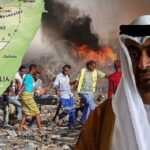Foreign aggression, Truths and Lessons for the Somali Nation & its Leadership.
By Saadiq Hurre
It was October 05. 1992. The disgraced Seyoum Mesfin of Ethiopia gives his first speech at the UN General Assembly as a host of the general debate at the 25th plenary meeting of the 47th session.
From the rolling cameras, one thing was conspicuously notable: The Seat of Somalia’s representative to the UN Assembly was empty.
Mesfin, after congratulating the President of the 47th Session of the UN, continued to his biggest agenda of the day – Somalia. At minute three of his speech, Mesfin begins “…I would like to draw the attention of the assembly to the unfolding tragedy in Somalia which defies imagination and affronts our senses and sensibilities. Over the past 2 years, the situation of the country (Somalia) has deteriorated: the State has ceased to exist, law and order, peace, stability and basic infrastructure necessary for the life of a functioning society is virtually nonexistent. These have all been destroyed by acts of intensifying warfare, the extent of whose damage – and the consequent human suffering – combine to make Somalia one of the worst humanitarian crises in living memory. It is lamentable that Somalia is bleeding by the actions
of its own sons” He continued until minute 12:12 before he moved to the next agenda. [i]
Why would an Ethiopian foreign minister dedicate 9 good minutes to ‘advocate’ for a known enemy country? Did he just feel pain and sympathy for Somalis in Somalia?
The answer is that the criminal clique at the helm of Ethiopia have spotted an opportunity in a new project – Somalia. They had an interest to have involvement in Somalia affairs for a number of reasons: One, to take revenge for 1977 grievances, and two for MONEY. By appealing to the world, the poor criminals who just overthrew the Ethiopian dictator Mengistu Haile Mariam saw an opportunity to enrich themselves from this new project called Somalia. And boy did they achieve these goals in real time.
Fast-forward to 2006, fifteen years from the day Mesfin stood at that lectern, Ethiopians invade our country to oversee chaos so that to realize their goal of achieving a totally destroyed Somalia.
In 2007, Aidan Hartley, a British Journalist documents in a four-part documentary to capture the human tragedy and horror that was taking place in Somalia. [ii] (Aidan Hartley, 2007). The journalist describes a life where millions went into refugee life with no access to aid, and remaining residents live in fear of imminent death. My attention was caught by a statement Aidan Hartley made in his documentary; “I decided to visit the place
where Mogadishu is ruled from – the Ethiopian embassy. The first man I want to see works in secret. We are warned against filming but we keep the camera running. The reason for all the secrecy is because the Ethiopians downplay the power they wield over the Somali government. This man Colonel Gabre is the only one that can open the doors to the four men I want to see. He is the most powerful man in Mogadishu” Aidan Hartley asks the disgraced Gabre to set up an appointment with four TFG crooks. The journalist continues “Somali leaders que up outside waiting for instructions from the Ethiopians and Colonel Gabre reveals that General Darwish is one of them”
The Ethiopian TPLF mafia’s twenty-seven year aggression on our country Somalia took place in two main ways: first is a domestically implemented divide-and-rule where they imposed on us the divisive federal system that gave rise to clan fiefdoms which undermines the national unity of Somalia; and secondly they unleashed a worldwide misinformation campaign against Somalia and its people. This mafia group openly tortured, murdered, intimidated and/or demoralized anyone in its path.
So what started in that winter of Oct. 05 1992 became a thorn in the heart of our country. In the decades that followed Ethiopians and others have ramped up their misinformation campaign against our country and its people. Just recently a senior Somali diplomat told me that British authorities once confided to him that at the forefront of Ethiopian foreign policy is to frame Somalia and the Somali people as incapable of self-government
and that the Somalis are inherently violent and that Ethiopia and others in the region are doing the world a favor by containing ‘barbaric’ Somalis from spreading extremist and violent terrorism around the world.
Last year 2021, marked the 30th anniversary since the official collapse of Somalia’s military government. What do we have? In crises to say the least. Divided as ever, widespread injustice, massive environmental devastation, several miles of charred wasteland, hunger and poverty are rife, dysfunctional governments characterized by conflict and endless political warfare where tribes compete for power (often violently).
Here is an undeniable truth: thirty years is more than enough to revive a nation. Why did our recovery take this long? How come we couldn’t start a solid recovery process?
The answer is complex but the absolute truth is that the Somali leadership (TFG or more recent governments) are the reason. In Somalia politics, most often the least competent individuals get to positions of power. These individuals often get power through tribal means and because they lack the necessary courage they end up being enablers of the enemy within. This results is an unruly system characterized by sheer incompetence where foreigners enjoy unlimited access into our nation’s internal affairs, putting our sovereignty at great risk.
It is insane to expect a properly functioning government when we put forward the most incompetent amongst the society to serve in government. Throughout the government, up and down the ladder, you find persons who are actually incompetent and/or functionally illiterate, or corrupt, or tribal bigot, or a pessimist, or all of the above. Who imposed this Kakistocracy on us?
Let’s now turn to a country whose context is similar to ours. That country is Rwanda. The tiny country was caught in a cycle of conflict and violence characterized by ethnic hatred and tribal power struggles until Paul Kagame showed up.
As Stephen Kinzer writes in his book, A Thousand Hills: Rwanda’s Rebirth and the Man Who Dreamed It,[iii] Kagame’s struggle to revive Rwanda faced fierce challenges. Aggression from everywhere sabotaged his efforts. Neighboring Uganda aggressed Rwanda. The French aggressed Rwandans in every possible way. Kagame rethought Rwanda by consistently and bravely calling out foreign destabilizers and fiercely fought against any foreign interference in his country’s affairs. He mobilized his people to prepare for total self-reliance and urged them make effort to shape their destiny.
By looking at Kagame’s example, it all boils down to the leader’s personality traits and willingness to fend off negative foreign influence even if that means giving up foreign aid designed to lure Africans into the bait-trap of dependency and mental poverty.
Another undeniable truth is that the world has failed us – the world failed Somalia. It is worth to note that five of the eight Secretaries-General the UN has had over its seventy-plus years of existence have served during the period when our country was in pain & suffering. None of them responded to our cries for help. In fact on the contrary, world bodies watched countries take advantage over us by plundering our resources and dumping industrial and nuclear wastes on our seas. The so-called International Court of Justice have historically dragged its feet regarding our country’s marine case against the culprit Kenya which blatantly seeks to annex not only our territorial waters but also mainland.
Similarly regional bodies historically humiliated our nation by treating our country in the most sarcastic way possible. And even the African Union itself showed indifference to our woes and from time to time treated us with contempt let alone having a concern to help us address our plight. It was always clear that we are on our own & that we had only ourselves to fix our issues.
How stupid must we be to never realize that it is actually our job to fix our problems and rebuild ourlives? To tell us even more clearly that we are on our own, former US President Bill Clinton said this in a televised press release on Oct. 7. 1993: “It is not our job to rebuild Somalia’s society or even to create a political process that can allow the Somalia clans to live and work in peace. The Somalis must do that for themselves” [iv]
One thing Paul Kagame and his fellow leaders in Rwanda realized early on in the process is that they were on their own, that there was no savior coming from somewhere else to fix Rwanda’s problems.
Like all other African nations, our country’s problems are compounded by challenges dating back all the way to Colonial times. As columnist Patrick Gathara wrote in his insightful article published on the 135th anniversary of the infamous 1884 Berlin Conference: “The Berlin Conference was Africa’s undoing in more ways than one…the colonial powers superimposed their domains on the African continent. By the time independence returned to Africa… the realm had acquired a legacy of political fragmentation that could neither be eliminated nor made to operate satisfactorily.” [v]
In line with this colonial principle and in an effort to formalize the disintegration of the Somali Nation, eight British Professors at the London School of Economics & Political Science put out a 131 pages long document titled “A study for Decentralized Political Structures for Somalia” on August 1995.[vi] They proposed Somalia be further disintegrated into anarchical tribal fiefdoms.
In the midst of all this there came a few genuine partners for Somalia. One of them being the Republic of Turkey. In 2011, the then Prime Minister of Turkey H.E. Recep Tayyip Erdogan, now President, arrived in our nation’s Capital Mogadishu. [vii]
Five years later President Erdogan came back to Mogadishu to open the largest embassy Turkiye has ever built overseas. This underscores how serious the Turkish government was and is to have deep ties of Cooperation with our country and government.
However some Turkish officials with knowledge of the matter express their disappointment with the Somalia officials over unwillingness and/or incapacity to advance and materialize Turkey-Somalia relations.
In a perfect world one would expect that people whose country is the recipient of fierce foreign aggression, domestic and international terrorism would reason better and choose to put forward their best and brightest to respond to challenges. Unfortunately this is not the case, however there is still a chance for us to redeem ourselves.
Competent leadership is important not only because of the good it brings to the country but also the dangers it helps us avert. When ill-prepared and incompetent person gets appointed to an institution, they render it dysfunctional by creating confusion all over the place and eventually collapse it.
Truth is that our country has for decades been the world’s number one example for failed states. Our country’s name appeared at the bottom of every list. What worries me most is that as nations in the world work toward planned national, regional and global targets such as the 2023 vision for Africa Human Capital Project, vision 2030 to realize the SDGs, and
vision 2063 to silence guns, our country is left behind in the pursuit of those target visions.
It is global knowledge that we sunk so low. Wendy Sherman, former US Under Secretary of State spoke this truth to us. She said “Somalis have to decide whether they want to exist as disparate clans isolated from the world and in conflict with one another, or as a united country with all the attributes, benefits and responsibility that such unity brings. None of us can make that choice for Somalia. But Somalis should know if they choose to continue to come together, they will have enthusiastic, and substantial international support.” [viii]
It is a fact that no country had it easy and neither are we going to have it easy but the difference lies in how unwilling we have been to try and change the situation.
To redeem ourselves let’s earnestly come together and condemn the devil amongst us. Let’s make a vow to end this culture of anarchy that favors incompetence over competence in public service.
To quote the revered Muslim Scholar Dr. Mustafa H. Ismail Harun who says “Aggression has always been there since the beginning of humanity and that no amount of whining will ever help so the Somali people must learn to wait for no one in rebuilding their lives and country”
I call upon all of us to step back for a moment and reflect on all the aggression our people have endured over the past three decades; the pain and suffering they have been subjected to; consider all the truths; learn the lessons and act accordingly.
So what shall we do now? Well here is what we should do: 1) Dismantle and uproot the domestic networks installed to destabilize our country and undermine our national security and unity. 2) Counter the now globalized misinformation campaign against our country. 3) Adopt the Rwanda blueprint to stand up to regional and international bullies; 4) Step up our cooperation with genuine friends of our country and deepen ties.
The above goals can only be realized when we front our best and brightest.
References
Disgraced Seyoum Mesfin Speaks at The General Assembly’s general debate at the 25th plenary meeting of the 47th session, 05-Oct-1992: https://www.youtube.com/watch?v=9VeIVp71YaE&t=27s
- Kinzer, Stephen, and Paul Boehmer. A thousand hills: Rwanda’s rebirth and the man who dreamed it. Hoboken, NJ: John Wiley & Sons, 2008.
- President Clinton’s Address to the Nation on Somalia (1993); 2014; accessed on Sept. 2019; 2.am: https://www.youtube.com/watch?v=eYTq8MOIJvo
- Lewis, Ioan M. “A study of decentralized political structures for Somalia: A menu of options.” (1995).
- Turkish Prime Minister Erdogan arrives in Mogadishu; Aug, 21. 2011; accessed on Feb. 04. 2021: https://www.youtube.com/watch?v=aFsbYYKccKo
Wendy Sherman, former US Under Secretary of State. 2020; accessed Fri, Feb 05. 2021; 1.02 am https://youtu.be/j0j_GCBrwuE
The Writer Saadiq is a Somali youth leadership with particular focus on human development. He writes on Somali and wider Pan-African affairs. Find him on twitter https://twitter.com/SaadickH




